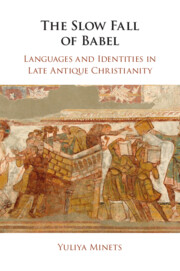Book contents
- The Slow Fall of Babel
- The Slow Fall of Babel
- Copyright page
- Dedication
- Contents
- Abbreviations
- Acknowledgments
- Introduction: Awakening to Linguistic Otherness
- Chapter 1 Meeting the Alloglottic Other: The Socio-Linguistic Landscape of the Ancient Mediterranean and the Spread of Christianity
- Chapter 2 Languages and Identities in Greco-Roman and Jewish Antiquity
- Chapter 3 The Tower of Babel and Beyond: The Primordial Linguistic Situation, the Original Language, and the Start of Linguistic Diversification
- Chapter 4 Speaking in Tongues in Christian Late Antiquity
- Chapter 5 Foreign Languages and the Discourse of Otherness
- Chapter 6 The Languages of Saints and Demons
- Conclusion: What’s in the Language?
- Bibliography
- Index
Chapter 2 - Languages and Identities in Greco-Roman and Jewish Antiquity
Published online by Cambridge University Press: 02 December 2021
- The Slow Fall of Babel
- The Slow Fall of Babel
- Copyright page
- Dedication
- Contents
- Abbreviations
- Acknowledgments
- Introduction: Awakening to Linguistic Otherness
- Chapter 1 Meeting the Alloglottic Other: The Socio-Linguistic Landscape of the Ancient Mediterranean and the Spread of Christianity
- Chapter 2 Languages and Identities in Greco-Roman and Jewish Antiquity
- Chapter 3 The Tower of Babel and Beyond: The Primordial Linguistic Situation, the Original Language, and the Start of Linguistic Diversification
- Chapter 4 Speaking in Tongues in Christian Late Antiquity
- Chapter 5 Foreign Languages and the Discourse of Otherness
- Chapter 6 The Languages of Saints and Demons
- Conclusion: What’s in the Language?
- Bibliography
- Index
Summary
The roles language played in shaping and articulating one’s identity in Greco-Roman and Jewish antiquity constitute a backdrop against which the new developments attested in early Christianity can be measured. The ways in which foreign language speakers appeared in the Jewish Bible and Classical literature provided tropes, references, and allusions widely employed by early Christian authors. The chapter starts with an analysis of ancient Greek literary, historical, and philosophical compositions, from Homer to Aristotle, and investigates why the thought universe of the Classical Greek literati was virtually monolingual. It then proceeds to an overview of developments in the Hellenistic and early Roman eras and traces how the monolingual antiquity of Classical Greece gradually became the bilingual universe of the Roman empire, where Latin always shared its prestigious status as a vehicle of culture with Greek. The final section focuses on how early Jewish traditions depicted foreign languages and their speakers and how this culture adapted multilingual self-expression. In the conclusion, we discuss why language was rarely a decisive factor of group identity in these cultures and problematize the idea that the presence of linguistic differences by itself is a sufficient factor to trigger the processes of identity consolidation and objectification.
Keywords
- Type
- Chapter
- Information
- The Slow Fall of BabelLanguages and Identities in Late Antique Christianity, pp. 53 - 98Publisher: Cambridge University PressPrint publication year: 2021

